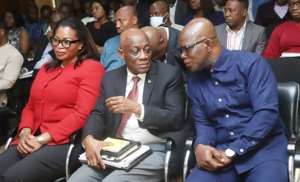
The Director-General of the State Interests and Governance Authority (SIGA), Professor Michael Kpessah-Whyte, has called on state-owned enterprises (SOEs) to commit to signing performance contracts, describing them as essential tools for driving efficiency, accountability, and measurable results in public sector institutions.
Addressing Chief Executive Officers of SOEs at a strategic meeting in Accra, Prof. Kpessah-Whyte stressed that SIGA’s mandate is not to interfere with day-to-day operations but to ensure state entities are meeting performance standards and delivering value for the Ghanaian people.
“SIGA’s role was not to control or micro-manage the affairs of state institutions but to evaluate the performance of state entities, ensuring they meet their targets and Key Performance Indicators (KPIs) and compliance,” he said.
He expressed concern about the reluctance of some institutions to embrace corporate governance principles, particularly the signing of performance contracts. He warned that avoiding such contracts often leads to vague mandates, operational inefficiencies, and a lack of measurable progress.
He further explained that signing these contracts should not be seen as a threat to leadership autonomy, but as a demonstration of commitment to transparency and sound governance.
“The commitment to signing performance contracts was not about individual personalities or egos but about ensuring administrative purity and good corporate governance in state institutions,” he said.
Prof. Kpessah-Whyte revealed that some institutions, including the Bank of Ghana—which previously did not engage with the performance contract process—had shown readiness to sign, while others remained hesitant.
He reiterated that for SIGA to effectively fulfil its oversight responsibilities, state institutions must align with governance protocols.
As part of its monitoring framework, SIGA “produces an annual State Ownership Report, which assesses the financial and operational performance of state entities,” in addition to “an annual Institutional Governance and Performance Assessment (IGPA) report, which evaluates the governance and performance of individual state entities, focusing on board decision-making, membership and compliance with the president’s vision.”
The most recent State Ownership Report, he noted, stirred intense public discourse and underscored the urgent need for greater transparency and reform across SOEs.
Aligning Governance with National Development
Presidential Advisor on the Economy, Seth Terkper, also addressed the meeting, commending SIGA’s evolution from the former State Enterprises Commission into a more robust authority with oversight over all institutions where the state holds an interest—including non-profit and service-oriented entities.
He urged state enterprises to treat KPIs seriously and commit to generating real returns for the government through operational efficiency and strategic alignment.
Terkper stressed that the performance of SOEs significantly impacts Ghana’s overall economic trajectory, especially as the country seeks to improve its creditworthiness and transition into an upper-middle-income economy.
While acknowledging Ghana’s current status as a lower-middle-income country, he expressed optimism: “With prudent management of its rich resources and continued investor attraction, the nation could ascend to an upper-middle-income status.”
He further called on state agencies to operate within Ghana’s legal and fiscal frameworks, citing the importance of adhering to constitutional guidelines, including the role of the Public Services Commission outlined in Chapters 13 and 15 of the Constitution.
Terkper also pointed to a chronic misalignment between political manifestos and long-term development plans, which he said has left many Metropolitan, Municipal, and District Assemblies (MMDAs) without coherent direction.
He called for a strategic reset, beginning with stronger coordination between the National Development Planning Commission (NDPC), ministries, departments, and agencies.
“One of the biggest tasks we have is to synchronise it to the finance ministry,” he said, stressing that performance across government institutions must be anchored in strategic objectives and aligned with the national fiscal calendar and medium-term planning framework.


